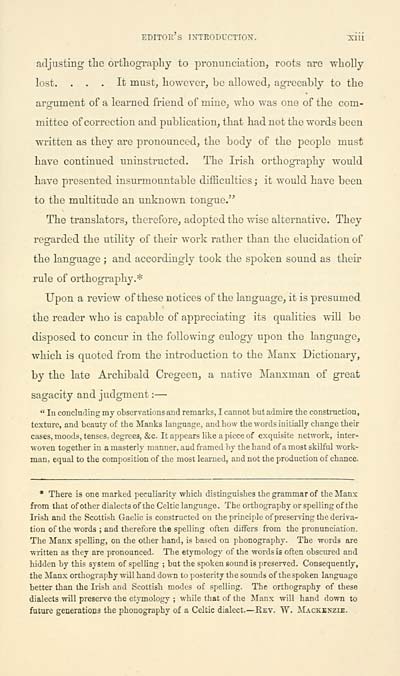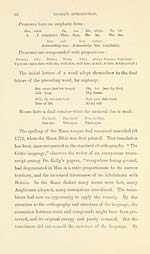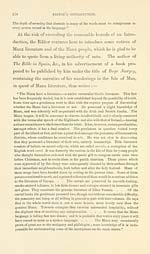Blair Collection > Practical grammar of the antient Gaelic, or, Language of the Isle of Man, usually called Manks
(17)
Download files
Complete book:
Individual page:
Thumbnail gallery: Grid view | List view

EDITOR S INTRODUCTION. ^111
adjusting the ortliograpliy to pronunciation, roots are wholly-
lost. ... It must, however, be allowed, agreeably to the
argument of a learned friend of mine, who was one of the com-
mittee of correction and publication, that had not the words been
wi'itten as they are pronounced, the body of the people must
have continued uninstructed. The Irish orthography would
have presented insurmountable difficulties ; it would have been
to the multitude an unknown tongue.'^
The translators, therefore, adopted the wise alternative. They
regarded the utility of their work rather than the elucidation of
the language ; and accordingly took the spoken sound as their
rule of orthography.*
Upon a review of these notices of the language, it is presumed
the reader who is capable of appreciating its qualities will be
disposed to concur in the following eulogy upon the language,
which is quoted from the introduction to the Manx Dictionary,
by the late Archibald Cregeen, a native Manxman of great
sagacity and judgment : —
" In concluding my observations and remarks, I cannot but admire the constmction,
texture, and beauty of the Manks language, and how the words initially change their
cases, moods, tenses, degrees, &c. It appears like a piece of exquisite network, inter-
woven together in a masterly manner, and framed by the hand of a most skilful work-
man, equal to the composition of the most learned, and not the production of chance.
* There is one marked peculiarity which distinguishes the grammar of the Manx
from that of other dialects of the Celtic language. The orthography or spelling of the
Irish and the Scottish Gaelic is constructed on the principle ofpreserving the deriva-
tion of the words ; and therefore the spelling often differs from the pronunciation.
The Manx spelling, on the other hand, is based on phonography. The words are
written as they are pronounced. The etymology of the words is often obscured and
hidden by this system of spelling ; but the spoken sound is preserved. Consequently,
the Manx orthography will hand down to posterity the sounds of the spoken language
better than the Irish and Scottish modes of spelling. The orthography of these
dialects will preserve the etymology ; while that of the Manx will hand down to
future generations the phonography of a Celtic dialect. — Eev. W. Mackenzie.
adjusting the ortliograpliy to pronunciation, roots are wholly-
lost. ... It must, however, be allowed, agreeably to the
argument of a learned friend of mine, who was one of the com-
mittee of correction and publication, that had not the words been
wi'itten as they are pronounced, the body of the people must
have continued uninstructed. The Irish orthography would
have presented insurmountable difficulties ; it would have been
to the multitude an unknown tongue.'^
The translators, therefore, adopted the wise alternative. They
regarded the utility of their work rather than the elucidation of
the language ; and accordingly took the spoken sound as their
rule of orthography.*
Upon a review of these notices of the language, it is presumed
the reader who is capable of appreciating its qualities will be
disposed to concur in the following eulogy upon the language,
which is quoted from the introduction to the Manx Dictionary,
by the late Archibald Cregeen, a native Manxman of great
sagacity and judgment : —
" In concluding my observations and remarks, I cannot but admire the constmction,
texture, and beauty of the Manks language, and how the words initially change their
cases, moods, tenses, degrees, &c. It appears like a piece of exquisite network, inter-
woven together in a masterly manner, and framed by the hand of a most skilful work-
man, equal to the composition of the most learned, and not the production of chance.
* There is one marked peculiarity which distinguishes the grammar of the Manx
from that of other dialects of the Celtic language. The orthography or spelling of the
Irish and the Scottish Gaelic is constructed on the principle ofpreserving the deriva-
tion of the words ; and therefore the spelling often differs from the pronunciation.
The Manx spelling, on the other hand, is based on phonography. The words are
written as they are pronounced. The etymology of the words is often obscured and
hidden by this system of spelling ; but the spoken sound is preserved. Consequently,
the Manx orthography will hand down to posterity the sounds of the spoken language
better than the Irish and Scottish modes of spelling. The orthography of these
dialects will preserve the etymology ; while that of the Manx will hand down to
future generations the phonography of a Celtic dialect. — Eev. W. Mackenzie.
Set display mode to: Large image | Transcription
Images and transcriptions on this page, including medium image downloads, may be used under the Creative Commons Attribution 4.0 International Licence unless otherwise stated. ![]()
| Early Gaelic Book Collections > Blair Collection > Practical grammar of the antient Gaelic, or, Language of the Isle of Man, usually called Manks > (17) |
|---|
| Permanent URL | https://digital.nls.uk/81513626 |
|---|
| Description | A selection of books from a collection of more than 500 titles, mostly on religious and literary topics. Also includes some material dealing with other Celtic languages and societies. Collection created towards the end of the 19th century by Lady Evelyn Stewart Murray. |
|---|
| Description | Selected items from five 'Special and Named Printed Collections'. Includes books in Gaelic and other Celtic languages, works about the Gaels, their languages, literature, culture and history. |
|---|

